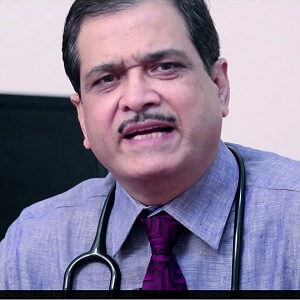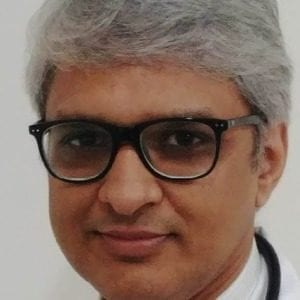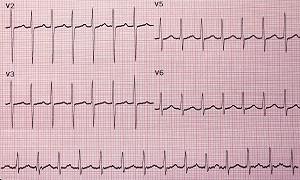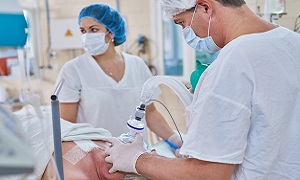Best Doctors in India for Ross Procedure
- Top Interventional Cardiologist | Apollo Hospital, New Delhi, India
- 26+ Years Experience
- Indraprastha Apollo Hospital, New Delhi
Profile Highlights:
- Dr. Rajeev Kumar Rajput is one of the best Cardiologists in India with nearly 23 years of experience. He is a clinical cardiologist engaged in diagnosing and treating cardiovascular diseases.
- Dr. Rajput is currently working as a senior consultant with Indraprastha Apollo Hospitals, New Delhi, and also offers patient care at the Heart & Gynae Clinic.
- Dr. Rajeev Kumar Rajput specializes in Angiography and Interventional Cardiology. The treatments provided involve Neonatal and Infant cardiac surgeries, Device Closure, and Valve replacement. He has expertise in Aortic Aneurysm Surgery, Vascular Surgery, Percutaneous Coronary Interventions, Endovascular Repair, Cardiac Catheterisation, Open Heart Surgery, and MV replacement.
- Dr. Rajput is credited with publishing several papers in noted medical journals.
- Interventional Cardiologist, Chennai, India
- Over 15 years’ experience
- Apollo Hospitals Greams Road
Profile Highlights:
- Dr. Sai Satish is a distinguished Senior Interventional Cardiologist affiliated with Apollo Hospitals in India, renowned for his pioneering contributions to the field of transcatheter valve therapies.
- His expertise extends internationally, as he also serves as a practicing interventional cardiologist and esteemed faculty member at the Gottsegen Institute of Cardiology in Budapest, Hungary, one of the world’s leading centers for TAVR (transcatheter aortic valve replacement) training.
- A trailblazer in the realm of minimally invasive cardiovascular procedures, Dr. Satish is celebrated for performing the highest number of percutaneous edge-to-edge mitral repairs (MitraClip implants) in the Indian subcontinent.
- Cardiologist, Gurugram, India
- Over 20 years’ experience
Profile Highlights:
- Dr. Vivek Chaturvedi is a highly experienced and acclaimed cardiologist with over 20 years of experience.
- He has performed more than 2500 cardiac ablations, several of them for complex arrhythmias like atrial tachycardia, ventricular tachycardia, VPC, and atrial fibrillation using the latest technology like 3D Electroanatomic mapping.
- He has more than 50 publications in international journals & books.
Best Hospitals in India for Ross Procedure
- City: New Delhi, India
Hospital Highlights:
- Over the last 33 years, the Fortis Escorts Heart Institute has set new standards in cardiac treatment with groundbreaking research. It is now known around the world as a centre of expertise for Cardiac Bypass Surgery, Interventional Cardiology, Non-invasive Cardiology, Paediatric Cardiology, and Paediatric Cardiac Surgery.
- The hospital has cutting-edge laboratories that perform a wide range of diagnostic tests in Nuclear Medicine, Radiology, Biochemistry, Haematology, Transfusion Medicine, and Microbiology.
- Fortis Escorts Heart Institute boasts a diverse group of bright and experienced doctors who are backed up by a team of highly qualified, experienced, and devoted support professionals as well as cutting-edge equipment such as the recently installed Dual CT Scan.
- Approximately 200 cardiac doctors and 1600 personnel currently collaborate to manage over 14,500 admissions and 7,200 emergency situations each year. The hospital now has a 310-bed infrastructure, as well as five cath labs and a slew of other world-class amenities.
- City: Faridabad
Hospital Highlights:
In the sprawling city of Faridabad, where healthcare needs are diverse and ever-evolving, one institution has consistently stood out as a beacon of excellence in the field of medicine—Marengo Asia Hospital. Established with a vision to provide world-class healthcare services to the community it serves, Marengo Asia Hospital has emerged as a trusted name synonymous with quality, compassion, and innovation in healthcare.
- City: New Delhi, India
Hospital Highlights:
- Equipped with 650 beds, BLK-Max Super Speciality Hospital is the largest stand-alone private sector hospital in Delhi.
- With over 1500 healthcare providers and 150 globally renowned super specialists, the hospital is one of Asia’s largest BMT Centres. The hospital is known for having some of the best cancer doctors in the country.
- The hospital is NABH and NABL accredited and was inaugurated by the first Prime Minister of India. Pt. Jawahar Lal Nehru.
- City: Chennai, India
Hospital Highlights:
- Located in Chennai, India, MGM Healthcare is a top multispecialty hospital that provides all medical services under one roof.
- Since its founding in 2019, MGM Healthcare has quickly become a leading national referral centre, creating several innovative flagship initiatives.
- MGM Healthcare combines next-generation medical and digital technologies to provide better patient results.
- With 12 centres of excellence, more than 400 inpatient beds, 100 intensive care unit beds, and 24/7 emergency care, MGM Healthcare leaves no chance in redefining the patient experience in Chennai.
- MGM Healthcare boasts 250+ expert doctors across 30+ departments, including Cardiology, Pulmonology, Neurology, Obstetrics & Gynaecology, and more.
- They house 12 specialized Centres of Excellence, including Neurosciences, Orthopaedics, and Multi-Organ Transplantation.
- Their team of doctors, nurses, and paramedics works together to give every patient individualized treatment.
- City: Noida, India
Hospital Highlights:
- Fortis Hospital, Noida, stands as one of the oldest and most trusted healthcare institutions in the region, setting a benchmark for comprehensive medical care.
- As the second mega hub hospital in the Fortis Healthcare Group, Fortis Hospital, Noida, upholds a legacy of trust among more than 1.2 million patients. By integrating top-tier professionals with cutting-edge technology, the hospital delivers superior treatment across various medical disciplines.
- Specializing in advanced Neurosciences, Orthopedics, Kidney and Liver Transplant Programmes, Fortis Hospital, Noida has successfully performed over 1,500 transplants, solidifying its reputation as a leader in specialized medical interventions.
Ross Procedure
The Ross procedure also known as the pulmonary autograft procedure, is a surgical technique meant to replace a diseased aortic valve. The procedure involves replacing the person’s aortic valve with a person’s own pulmonary valve. The pulmonary valve is next replaced with the person’s own pulmonary allograft.
The procedure is used more often in children, but its use in adults is controversial.
The procedure has been named after Dr. Donald Ross, a pioneer in cardiac surgery in the UK, who had performed it first in 1967.
Purpose
Over the past few years, the Ross procedure has gained significant popularity among people who need an aortic valve replacement. An operation is generally an excellent option for physically active young children, as well as young women who are of childbearing age.
The procedure is preferred as it has many as it has several advantages which include:
- No need for anticoagulation
- Growth potential in children
- Low incidence of thromboembolism
- Excellent Hemodynamics
- Low incidence of endocarditis
Preparation
It is likely that your doctor will recommend a few tests before the procedure, which includes:
- Chest X-ray
- Blood tests, in order to check the general health
- Electrocardiogram, to check the heart rhythm
- Echocardiogram, in order to look at the heart and the blood flow through the heart
- Heart catheterization, to better look at the coronary blood vessels or to measure the pressure in the heart and lungs
The hair around the area of operation might be removed prior to the surgery.
Procedure
Next, your surgeon will make an incision in the middle of the chest. In order to reach the heart, the surgeon will be separating the breastbone. Next, he/she will remove your diseased aortic valve and replace it with your own pulmonary valve, which is similar in anatomy.
Next, the breastbone is put together with wires, and the surgeon closes the muscle and the skin. A dressing will be applied as well.
Within a few months, the pulmonary valve becomes thicker and stronger and begins to behave like an aortic valve.
After the procedure
Risks
In most cases, the surgery is a success. But sometimes there might be a few complications. Risk factors might vary based on your age as well as other health problems. Some of the risks associated with this procedure include:
- Infection
- Excess bleeding
- Heart block
- Irregular heart rhythms
- Complications from anesthesia
- Blood clots leading to stroke or heart attack
Sometimes, the surgery might fail to work. This might make another surgery necessary.












